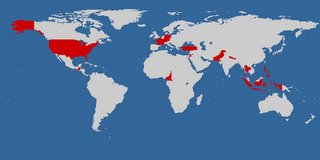On turning 40
19 July 2008
I turn 40 in four months and three days. This impending milestone has left me a tad unsettled. I have taken to brooding and to bouts of melancholy. I have lost my zest for my work. I feel listless and rudderless. Far too many things annoy me, and I get annoyed too easily.
(People not used to this sort of behavior from me have started to notice. I sense that my mood unsettles them as well, but having read enough self-empowerment literature, I know now that how other people react to me is their choice and therefore beyond my control.)
I’m trying to recall how my other decade markers affected me. I don’t think turning 20 even registered with me as a breakthrough moment. I was too busy juggling my main concerns at the time—finishing college, staying involved in campus activism, and keeping a difficult, long-distance relationship afloat.
When I turned 30, it sort of crept up on me as well. I was in the throes of several major life changes. I had just ended a long-standing, on-again/off-again relationship. I was transitioning into a new job completely alien to my former engagements with non-profit work. I had started graduate studies. I was falling for someone who I knew in my heart loved me completely, but whose prior ties doomed our relationship to remaining incomplete. At 30, I was dealing with a number of complications that were enough to be getting on with. I had no time, energy or inclination to brood.
Now, it seems, all I can do is brood. There are still complications, dissatisfactions and distractions aplenty, to be sure. But there is no escaping 40. It’s an age that signifies something incredibly irreversible. When you hit 40, you know you’ve run out of excuses. It’s the end of an era, the end of all postponements and procrastinations. It’s time to get serious. (If only I were completely clear about what I need to get serious about! Then again, are we ever completely clear about these things?)
All evidence points to the importance and the inevitability of marking this milestone somehow. Marianne Williamson says this mid-point milestone calls for a rite of passage. It deserves to be celebrated, even as it demands sobriety and seriousness. A couple of ideas have dawned on me. The first is to pay homage to the wisdom and life experience of those women who have come before me, and the second is to share what life lessons I’ve learned with those for whom 40 is still a far-off number. I intend to write “fan mail” to 40 women I admire (most likely those who hit 40 before I did) to let them know while I can how they have influenced me. I intend to write a memo of sorts to the younger generation, to share 40 things I learned on the road to turning 40. Finally, I’d like to gather 40 women closest to my heart—be they older and wiser or younger and braver—to celebrate with me as I mark this momentous occasion. (I know it’s so Oprah, but she’s one of the 40 people I admire and it was on her show that I heard Marianne Williamson speak so eloquently about rites of passage, so give me this.)
I’ve heard it said that 40 is the age of acceptance, the age of surrender. I do not think they mean it in a defeatist sense. It’s not to say that you surrender all effort to change what needs to be overturned. I guess it’s what the prayer of serenity says so succinctly: “God grant me the serenity to accept the things I cannot change, the courage to change the things I can, and the wisdom to know the difference.”
It’s also the time to accept and acknowledge everything that has come to pass: every feat I’ve accomplished, every mistake from which I learned, every frailty that makes me fully vulnerable and fully human, every quirk that makes me unique.
More importantly, 40 is the time for me to get clear on the things that will matter 40 years onward, and what I still need to get done in the time I have left so that I spend it on things that mean the most to me.
Looking back, I must say it’s been a full plate, these past four decades. Not earthshaking or history changing, by any means, but not a complete waste of time and space either. I’ve shown some skill and I’ve been recognized for it. I’ve made my parents proud. I’ve been of service to those who needed a hand up. I’ve been published. I’ve helped to get farmers’ issues in the public agenda. I’ve been quoted by at least two writers I admired. I’ve been able to find work that gets me involved with the causes of children. I’ve pushed myself to serve children in need outside my country, even in difficult circumstances that tested my limits. I’ve traveled to places both beautiful and unfamiliar. I have loved earnestly, sincerely and completely; and I have been loved back, even if it did not last forever. I have known the happiness that comes with unconditional love. I have weathered the loss of both parents, and learned how to conduct my life from their example. I have known the heights of pleasure, and the depths of grief. I have known regret and remorse. I have committed cringe-worthy mistakes. I’ve lied to others, and to myself. I have caused others to hurt needlessly. I have faltered and failed. I have lived.
Still, there is much left to buckle down and do. There are still several items unticked on my life list, and I need to get cracking. But let me start with a meaningful celebration of my 40th year on this planet. It’s the right time to do it.




